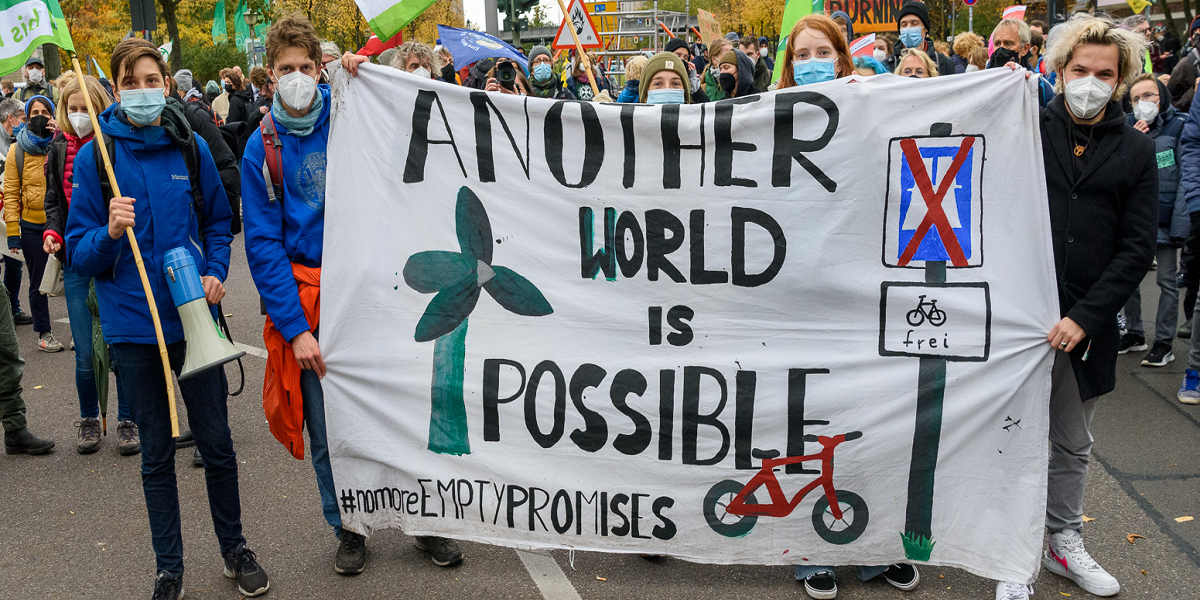I would like to begin by observing how the question posed before us today — what would a fairer society look like? — refrains from conjuring an ideal society. It invites us instead to a limited, seemingly grounded, comparative framework. It demands we imagine not a just society, but a fairer one. Fairer than what? Every hitherto existing ‘society’? Or this one of hereditary rights, hereditary privileges, hereditary property; fairer than this commonwealth of food banks built through colonial dispossession and slavery?
Nevertheless, implicit in the question of a fairer society is the possibility, even the desirability of transformation. But if something needs to be changed, that something falls short of everything we would need to transform to live in a just society—economically, politically, ecologically, ethically, globally. That everything includes ‘realistic’ questions which strangle the imagination, rendering our yearning for revolutionary change and justice ‘unrealistic,’ not merely for now, but forever.
Yet it is in the nature of every ‘revolutionary passion for justice,’ as Hannah Arendt once named it, to resist this strangulation. The longing for what appears to be impossible compels us, in Che Guevara’s aphoristic command, to be realistic by demanding the impossible. This revolutionary realism, as I would call it, contrasts sharply with what cultural critic Mark Fisher describes as capitalist realism.
The longing for what appears to be impossible compels us to be realistic by demanding the impossible
Capitalist realism is, in Fisher’s words, ‘the widespread sense that not only is capitalism the only viable political and economic system, but also that it is now impossible even to imagine a coherent alternative to it’. Margaret Thatcher’s forceful insistence that ‘there is no alternative’ represents perfectly well the confining vision of neoliberals who are ‘capitalist realists par excellence’. Invested in drawing borders around the imaginable and the possible, their ideological work consists in shaping our sense of ‘reality’ and with it, what is and is not seen as realistic and achievable.
Fisher argues further that ‘capitalist realism is not a particular type of realism; it is more like realism in itself’. This realism seeks to provide, I would emphasize, an epistemic ‘shield protecting us from the perils posed by belief itself,’ especially ‘belief’ in anti-capitalist ideologies of the past. Nevertheless, capitalist realism maintains the prevalent and depressive ‘belief’ that all hope is a ‘dangerous illusion’ today. It renders any revolutionary desire for justice—social, global, economic, ecological—not merely ‘unrealistic’ but naively, if not madly, misguided.
Capitalist realism pens our imagination in colourless parades of trooping pragmatism, policing the limits of our capacities to act, to live, even to love one another differently. In this situation, the injunction to be realistic by demanding the impossible requires immeasurable ‘experiments in imagining otherwise,’ in feminist writer Lola Olufemi’s formulation.
It is not incidental but essential to capitalism, however, that it incorporates into the global market as consumable goods our own anti-capitalist desires for living differently, according to different principles, in a just society. In this scene, Fisher finds, ‘alternative’ and ‘independent’ cultural spaces and attitudes become established styles, ‘in fact, the dominant styles, within the mainstream’. This insight allows him to observe how ‘capitalist realism is very far from precluding a certain anti-capitalism’.
Capitalist realism pens our imagination in colourless parades of trooping pragmatism, policing the limits of our capacities to act, to live, even to love one another differently
Here and now, the LSE Festival—with its ‘alternative’ question of a fairer society—can offer one example of what Fisher names ‘corporate anti-capitalism’. How else shall we explain its silent disavowal of the militant strike wave sweeping through—and beyond—the academy today? As unionised workers at the LSE demand survivable workloads and survivable working conditions, decent pay and decent pensions, it becomes impossible not to question the profit-making calculus of capitalist realism. Is this what a ‘fair’ university looks like?
Today, well-funded institutes examining inequality and well-attended festivals curated to demonstrate ‘impact’ and ‘corporate social responsibility’ both evidence and cater to our desire for social change and justice. They also offer corporations the opportunity to ‘shape the World,’ as the LSE slogan has it, by confining revolutionary desires and energies within the borders of capitalist realism. In Fisher’s words, such undertakings ‘perform our anti-capitalism for us’—not unlike Disney films with anti-capitalist themes, even this very speech. They enable us to participate in capitalism with a clear ‘conscience.’
Nevertheless, there are moments and movements, networks and collectives, a surrealist poetics where capitalist realism cracks. Growing through those cracks, we become a spring. The Arab Spring, the Occupy spring, the movement for black lives spring to mind. They find us mad at last. Justice—that burning longing enchanting every mantra of revolutionary action—opens the scene of our imagination. We promise. ‘No justice, no peace’.
Without capitalist realism, what would a just society really look like?
Excerpted from a speech by Ayça Çubukçu at the London School of Economics festival, 2023











